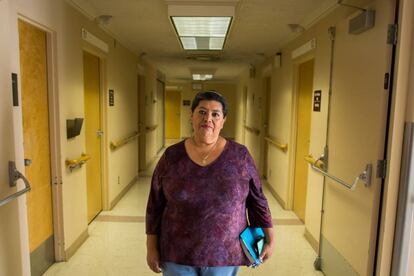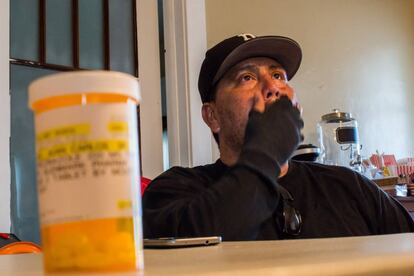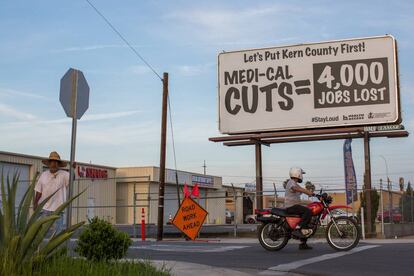How Americans who voted for Trump now fear for their health insurance
In the Republican stronghold of Bakersfield, California, 95,000 people depend on Obamacare

Juan Carlos and his wife Julie Solís have nothing left. He lost his job in the construction industry when he was diagnosed with valley fever, an infectious fungal disease, back in 2008. His case shows how falling ill in the United States can ruin a family financially.

He couldn’t afford medical insurance, and so to pay for his treatment he and his wife ended up selling several properties to raise funds, as well as using the money they had set aside to pay for their three children’s university tuition. They even sold their wedding rings. Julie says that if Barack Obama’s Affordable Care Act (ACA) – dubbed Obamacare – had not been introduced in 2010, her husband would have died: “We couldn’t afford the medication he needed.”
The Solís family live in Bakersfield, in Kern county, a rural, largely working class area in California where Hillary Clinton garnered just 40.4% of the vote compared to Donald Trump’s 53% – despite her winning twice as many votes as her rival in the state overall.
There are people who’d be dead without Obamacare Bill Phelps of hospital group Sierra Vista
Kern is also the district of Kevin McCarthy, the Republican Majority Leader in the House of Representatives. McCarthy has made overturning Obamacare his personal crusade. Trump is trying to get his healthcare counter reform that would end Obama’s state aid enacted as quickly as possible.
Bakersfield is now a ground zero of the plan: a macabre paradox, given that poor rural areas like this that voted for Trump have the most to lose. Wealthier Californians who live on the coast, and who mostly voted for Clinton, will now get tax breaks.
More than 95,000 people, around 10% of Kern’s population, will lose health cover after funding for Medicaid – the public health system extended by Obama – is cut, according to a study by the University of California, which says that more than 16,000 people will lose subsidies toward their private health insurance. Under Obamacare, the number of people without medical cover fell in the county from 18.2% to 7.9%. The study also estimates that withdrawing the funding will mean the loss of 5,000 jobs in the county.

“Our community is afraid,” says Edgar Aguilar, head of the Community Health Initiative, a program that advises people about healthcare options and helps them sign up for Obamacare. In this rural area, he says, most people cannot afford private healthcare and are not covered by their employers.
But signs of protest are emerging, with posters and hoardings warning about the consequences of dismantling Obamacare. “McCarthy says he knows what people want: he must be talking to people other than us,” says Aguilar.
Javier Reyes, the 34-year-old Young Republicans leader in Kern, says he is “surprised at the accusations that people are going to lose their Medicaid,” saying the program is instead being “restructured.” The assumption is that states that extended health cover thanks to federal funds (which in California amount to $20 billion a year) will not be able to manage on their own.
Reyes says Trump’s plans will “give more choice” because at some time in the future, a national insurance market will be created that will lower prices. Reyes says that warnings that millions of people will lose their healthcare cover, including those from the Congressional Budget Office, are wrong, “as they were wrong about Trump winning.”
“I don’t know why some people think that the market will lower prices when fewer people are insured,” says Bill Phelps, head of programs at Sierra Vista, a hospital group for low-income people in the county. He says Obamacare doubled the amount of money his organization received from the federal government. Its 148,000 patients (75% of them Hispanic) have to decide whether to see a doctor or eat and pay the rent.

“There are people who’d be dead without Obamacare,” says Phelps. “The number-one reason for personal bankruptcy in the United States is medical debts,” he adds, saying that people voted for Trump based on fear of immigration: “They didn’t think about the consequences. People are going to die.”
Betty Basulto, a 53-year-old who has lived in the United States for the last 27 years working as a grape picker and earning $1,000 a month at best, says she hasn’t slept properly since Trump won. She had Medicaid because of her son, but now he is 18, she doesn’t know what she will do. Thanks to her three jobs and the ACA she has insurance that costs her $350 a month and that allows her to treat her diabetes and chronic colitis. Her son, now studying at university, doesn’t have health insurance: “Maybe he’ll have to quit and get a job,” she says.
The Republican Party seems ready to ignore the warnings and to dismantle Obamacare as soon as possible, and places like Bakersfield, where people voted for Trump, have the most to lose.
Edgar Aguilar says people don’t like Obamacare, but they do want healthcare reform. Either way, the Republican Party in places such as Bakersfield is nervous, he says, noting: “People have had a little taste of what healthcare is like, and nobody can take that away.”
English version by Nick Lyne.
Tu suscripción se está usando en otro dispositivo
¿Quieres añadir otro usuario a tu suscripción?
Si continúas leyendo en este dispositivo, no se podrá leer en el otro.
FlechaTu suscripción se está usando en otro dispositivo y solo puedes acceder a EL PAÍS desde un dispositivo a la vez.
Si quieres compartir tu cuenta, cambia tu suscripción a la modalidad Premium, así podrás añadir otro usuario. Cada uno accederá con su propia cuenta de email, lo que os permitirá personalizar vuestra experiencia en EL PAÍS.
¿Tienes una suscripción de empresa? Accede aquí para contratar más cuentas.
En el caso de no saber quién está usando tu cuenta, te recomendamos cambiar tu contraseña aquí.
Si decides continuar compartiendo tu cuenta, este mensaje se mostrará en tu dispositivo y en el de la otra persona que está usando tu cuenta de forma indefinida, afectando a tu experiencia de lectura. Puedes consultar aquí los términos y condiciones de la suscripción digital.








































